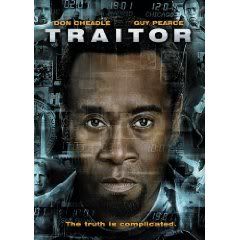The movie is called "Traitor," and the implication is that the main character, played by Don Cheadle, has betrayed his own country. But it's nowhere near that simple. Some think he's a traitor to the United States while others think he's a traitor to Islam. He may be a traitor to his own beliefs, his loyalties divided between his Muslim faith and his American upbringing. By the end of the film, no one is any closer to understanding what he believes, himself least of all. He's a double agent frequently confronted by conflicting ideologies, and it's slowly but surely tearing him apart. One way this movie succeeds is that we're able to feel for this character no matter what side he's on; we can sense the anguish he feels, the torment of being a misfit in every culture he immerses himself in. We see in his face the unease and guilt he's forced to live with everyday. Cheadle plays Samir Horn, who was born in Sudan but raised in the United States. Thirty years ago, his father was killed in a terrorist attack, although it's unclear which side was responsible; it may have been an anti-Muslim faction, but it may also have been devout Muslims who opposed his beliefs. Whatever the case, Horn is now a Special Forces Engineer Sergeant for the United States Army, someone trained to infiltrate terrorist organizations and gather information. It seems his loyalties have shifted; while in Yemen, he's caught selling detonators to a group of jihadists, and after a brief shootout, everyone is arrested. In prison, he befriends Omar (Saïd Taghmaoui), who is apparently in league with people on the outside, people willing to risk incarceration or death to free their brother Muslims. A frenetic jailbreak ensues. Not long after, Horn becomes entangled in a terrorist conspiracy, one that would result in several major attacks on American soil. Two FBI agents have been assigned to locate and arrest Horn. One is Roy Clayton (Guy Pearce), who, interestingly enough, once considered World Religions as a college major. He claims to take his own Christian faith seriously, but unlike Horn with the Koran, we never see him reading from the Bible or quoting any of its passages. We're never told what Max Archer (Neal McDonough) believes, although it's obvious that, as far as his job is concerned, he's all about getting results as quickly as possible; in an early scene, he gets impatient with Horn and subsequently punches him in the stomach. Clayton is much more calm and collected, and he understands that you get information from a suspect by pushing his buttons, not by letting him push yours. Indeed, Horn is a tough nut to crack, probably because he knows how to keep secrets from both sides. To describe the plot any further would not only give too much away, it would also require a lot of explaining, more so than anyone would be willing to read. As Horn says, "The truth is complicated." It would be more accurate to say that the truth is elusive, simply because I'm not convinced he knows what the truth is. He probably no longer knows which side represents good and which side represents evil. His beliefs are divided between what he reads in the Koran and what he sees going on; one passage states that killing one man is like killing all mankind, yet he's surrounded by Islamic extremists who commit murder to get their point across. He's serious about his faith, but it's clear he doesn't always understand it. He certainly doesn't understand how certain ideas can be misconstrued out of all reason, such as Takfiri, or blending in. A Pakistani terrorist named Fareed (Aly Khan) baffles Horn by saying that jihadists living in America drink alcohol and eat pork in order to blend in. Both acts go against Islamic beliefs. Horn would probably argue that murder, no matter how justified, also goes against Islamic beliefs (I would make the same argument, although I'm well aware that many people would not). If there were no jihadists, if terrorism were to be eradicated entirely, Horn would not need to be a Special Forces Engineer Sergeant. He would not have to infiltrate enemy hideouts and pretend to be on their side. Only then would his mind be at ease; he could worship in peace without having to worry about suspicious activity in American and Muslim communities. Is it unreasonable to suggest that the vast majority of Muslims long for the same peace of mind? I don't think so. Neither is the idea that there's a gigantic difference between jihad terrorists and those of Islamic faith. That may ultimately be the point "Traitor" is trying to make, although it's difficult to tell with a story actively trying to be ambiguous. Director Jeffrey Nachmanoff and producer/co-story creator Steve Martin (yes, that Steve Martin) have crafted a political drama that forces the audience to think really hard, more about the main character's beliefs than about the actual plot. Themes of not belonging and divided loyalties are certainly not new, but that doesn't mean they're no longer used effectively; "Traitor" succeeds on many levels, not the least of which is Don Cheadle's believable performance. He above all else is what gets the story off the ground, allowing it to be much more than a run-of-the-mill thriller. He adds genuine emotional touches in the subtlest of ways, from precise eye movements to random breathing patterns. Essentially, he makes it real, especially since he never reveals which side his character feels most connected with.
